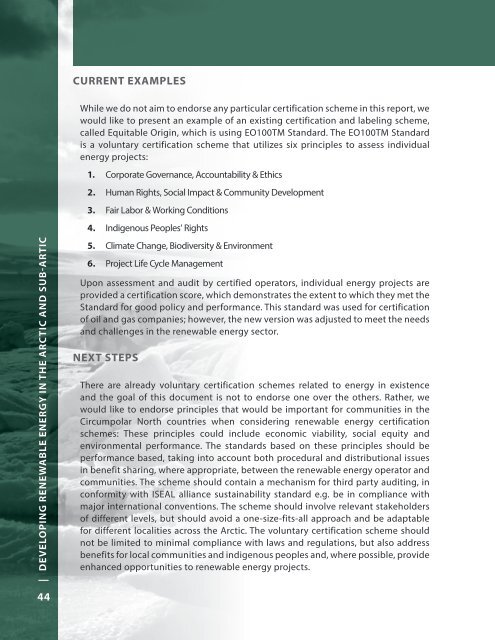DEVELOPING RENEWABLE ENERGY IN ARCTIC AND SUB-ARCTIC REGIONS AND COMMUNITIES
FulbrightArcRenewableEnergy
FulbrightArcRenewableEnergy
Create successful ePaper yourself
Turn your PDF publications into a flip-book with our unique Google optimized e-Paper software.
CURRENT EXAMPLES<br />
While we do not aim to endorse any particular certification scheme in this report, we<br />
would like to present an example of an existing certification and labeling scheme,<br />
called Equitable Origin, which is using EO100TM Standard. The EO100TM Standard<br />
is a voluntary certification scheme that utilizes six principles to assess individual<br />
energy projects:<br />
1. Corporate Governance, Accountability & Ethics<br />
2. Human Rights, Social Impact & Community Development<br />
3. Fair Labor & Working Conditions<br />
4. Indigenous Peoples’ Rights<br />
| <strong>DEVELOP<strong>IN</strong>G</strong> <strong>RENEWABLE</strong> <strong>ENERGY</strong> <strong>IN</strong> THE <strong>ARCTIC</strong> <strong>AND</strong> <strong>SUB</strong>-ARTIC<br />
5. Climate Change, Biodiversity & Environment<br />
6. Project Life Cycle Management<br />
Upon assessment and audit by certified operators, individual energy projects are<br />
provided a certification score, which demonstrates the extent to which they met the<br />
Standard for good policy and performance. This standard was used for certification<br />
of oil and gas companies; however, the new version was adjusted to meet the needs<br />
and challenges in the renewable energy sector.<br />
NEXT STEPS<br />
There are already voluntary certification schemes related to energy in existence<br />
and the goal of this document is not to endorse one over the others. Rather, we<br />
would like to endorse principles that would be important for communities in the<br />
Circumpolar North countries when considering renewable energy certification<br />
schemes: These principles could include economic viability, social equity and<br />
environmental performance. The standards based on these principles should be<br />
performance based, taking into account both procedural and distributional issues<br />
in benefit sharing, where appropriate, between the renewable energy operator and<br />
communities. The scheme should contain a mechanism for third party auditing, in<br />
conformity with ISEAL alliance sustainability standard e.g. be in compliance with<br />
major international conventions. The scheme should involve relevant stakeholders<br />
of different levels, but should avoid a one-size-fits-all approach and be adaptable<br />
for different localities across the Arctic. The voluntary certification scheme should<br />
not be limited to minimal compliance with laws and regulations, but also address<br />
benefits for local communities and indigenous peoples and, where possible, provide<br />
enhanced opportunities to renewable energy projects.<br />
44


